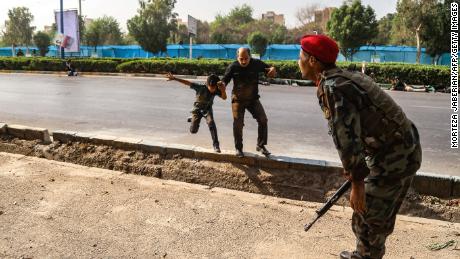(CNN)Iranian Foreign Minister Javid Zarif had no doubt who was to blame for Saturday's attack on a military parade in Iran that killed at least 29 people and left 70 others injured.
"Terrorists recruited, trained, armed & paid by a foreign regime have attacked Ahvaz," he tweeted as the news broke.
Exactly which group carried out the attack was unclear on Sunday with confusion after several groups were named by local media outlets. The radical Islamist group ISIS also claimed responsibility, as it invariably does, most likely for a quick propaganda coup. The terrorist group offered no proof.
A local Sunni separatist group, Patriotic Arab Democratic Movement in Ahwaz, issued an emphatic denial after the state-run Islamic Republic News Agency reported it had claimed responsibility for the attack.
Another group, the Arab Struggle Movement for the Liberation of Al-Ahwaz, was also accused of perpetrating the attack but its spokesman, Yacoub Hor Al-Tustari, told CNN his group was not to blame.
A spokesman for Iran's Revolutionary Guard Corp fueled the finger-pointing, saying it was terrorists backed by Saudi Arabia. In his tweet, Zarif said "US masters" were behind the attack. Saudi Arabia has yet to respond to the allegations.
The attack comes at a time when relations between Riyadh and Tehran are increasingly febrile.
Whoever is responsible for the killing of Iranian troops and civilians at the military parade -- and we may never know for sure -- may have lit the touch paper on a dangerous escalation of tit-for-tat terror.
Iran has accused Saudi Arabia of backing terrorist attacks before, but not attacks of this magnitude.
It is also unusual for an attack of this scale inside Iran, and unusual that so many soldiers should be killed.
The fact that the attack happened at a military parade to celebrate the 30th anniversary of the eight-year war with Iraq that killed as many as half a million troops strikes a deep wound in the pride of the Iranian state.
The stakes for the theocratic regime -- already battling an undercurrent of popular unrest over rising inflation and uncertainty -- are high.
Foreign Minister Zarif's tweet went on to threaten revenge. "Iran holds regional terror sponsors and their US masters accountable for such attacks. Iran will respond swiftly and decisively in defense of Iranian lives," he wrote, reflecting his government's frustrations.
His language, however, appears to play directly into US President Donald Trump's hands.
In just a few days, at the United Nations General Assembly, Trump plans to host a UN Security Council meeting where, according to US Ambassador to the UN Nikki Haley, Trump will "address Iran's destabilizing aggression and sponsorship of terrorism."
Iran's growing influence
The question has to be, why this attack, and why now?
To find the answer, it is perhaps necessary to look at recent reminders of Iran's growing influence and threat in the region.
The Shia theocracy has become more ingrained in Iraq's institutions and more entrenched in Syria. Most worryingly for Israel's leaders, who consider Iran an existential threat, Iran's biggest proxy, Hezbollah, is gaining strength just over Israel's border in Lebanon.
Thursday, Hezbollah leader Hassan Nasrallah capped 10 days of Shia celebrations with a speech announcing that he now possesses "precision missiles" capable of accurate strikes deep inside Israel.
But the event whose timing most seems to invite retaliation, if that's what the Ahvaz attack was, was an Iranian attack earlier this month on the Democratic Party of Iranian Kurdistan, an anti-Iranian group deep inside Iraqi territory.
The artillery assault September 8 on the Iraqi Kurdish town of Koysinjac was blatant and brutal. Iran made no effort to hide its hand behind the shells that rained down.
Several of the anti-Iranian groups' headquarters buildings were destroyed and many of its troops killed in a sustained barrage of fire on a number of locations in the town.
The group threatened retaliation -- that was two weeks ago -- possibly a large enough window for someone to plan and prepare a counteraction.
In the maddeningly confusing m├®lange of fighting groups under arms in Iraq and Syria right now, it has become almost normal that some are backed by regional and international powers, including the United States.
In that climate, an avowedly anti-Iranian group in Iraq, such as the one targeted two weeks ago, can expect to have local allies in Iran and even unwitting or possibly witting international benefactors -- even if there are no official lines of command, control and responsibility.
Simply put, Iran's strike outside its border in Koysinjac may have sent a message back across the border to affiliated anti-Iranian sympathizers.
If this is the case, and there is no evidence to show that it is, then Saturday's attack in Ahvaz won't be the end of the story.
And even if it's not, Iran is still going to want revenge.
The UNGA next week, whatever Trump says, is unlikely to break what threatens to become a destabilizing cycle of cross-border attacks.





